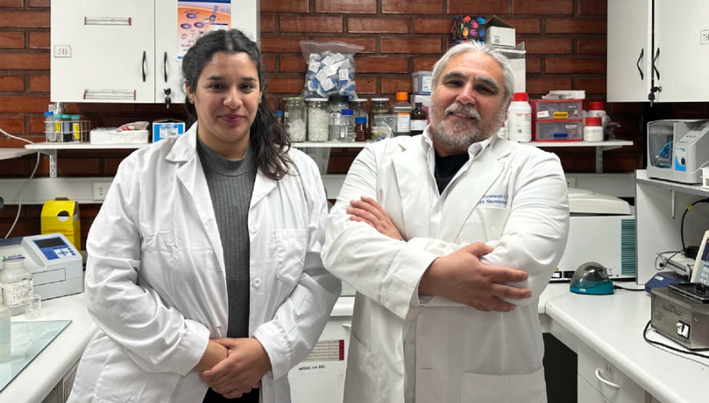Chilean fruit farming has grown steadily in recent decades, driven by high international demand. To maintain its competitiveness, the sector has adopted more intensive practices such as higher planting density, aggressive pruning, and increased use of fertilizers.
However, these strategies have favored the emergence of diseases caused by phytopathogenic fungi, particularly so-called fruit tree wood diseases, which ultimately weaken the trees' structure and significantly reduce their productivity.
To address this issue, the University of Santiago is implementing the Fondef R&D 2024 project "Development of a nano-biotechnological formulation based on organic fungicides for the prevention and treatment of wood diseases in fruit trees," led by Dr. Luis Constandil, Director of the Neurobiology Laboratory, alongside Dr. Natalia Juica, both researchers from the Faculty of Chemistry and Biology.
The initiative involves ANASAC, an agricultural and veterinary products company, as an associated entity, and its execution is supported by our Vice-Rectory for Research, Innovation, and Creation (Vriic) and the Directorate of Technological Management (DGT).
As Dr. Luis Constandil explains, the research aims to "develop a formulation based on eco-friendly nanoparticles, synthesized from natural polymers loaded with natural antifungal agents to control infections affecting fruit trees."
Additionally, Dr. Natalia Juica adds that they seek to propose "a biodegradable and low-environmental-impact solution, offering an effective alternative for agricultural use compared to traditional synthetic pesticides."
To achieve these goals, the project will leverage the capabilities, knowledge, and experience of the Neurobiology Laboratory in the synthesis, characterization, and evaluation of biopolymeric nanoparticles in R&D projects for biomedicine and agriculture.
Effective and Safe Formulation
Currently, the research is in its first execution phase, focused on synthesizing and characterizing nanoparticles with antifungal compounds extracted from natural sources.
In a second phase, the team will evaluate the formulation's effectiveness, both in laboratory settings and real-world environments. They will also study whether these nanoparticles exhibit toxic effects on animal and plant cells before advancing toward a safe and reliable solution for agricultural use.
Upon project completion, they expect to "reach a technology maturity level close to TRL 5, meaning a prototype tested in a relevant environment," details Dr. Luis Constandil.
Subsequently, in collaboration with ANASAC, they aim to progress toward larger-scale testing and validate its performance in the field.
Benefits for the Industry
From the research team's perspective, this type of sustainable solution for addressing wood diseases in fruit trees can bring various benefits to the industry, such as "reducing economic and productive losses, improving effectiveness in prevention and health management of fruit trees, and minimizing impacts on human health, among others," states Dr. Constandil.
Finally, they plan to advance product development by seeking new funding sources to further scale this formulation in partnership with ANASAC.







Comments (0)
No comments yet. Be the first to comment!
Leave a comment